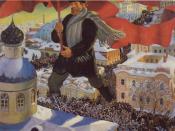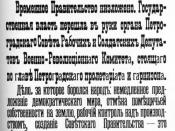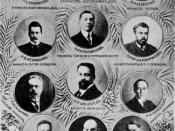The old Russian society was a brutal capitalist society, headed by a king called the Tsar. The country was controlled by wealthy capitalists allied with big landowners, who supported the Tsar and exploited the peasants and workers. Poverty, brutal exploitation in the factories, hunger and constant war created a strong revolutionary mood among the working class. The Provisional Government was opposed by the soviets, or councils of workers and peasants, who wanted the right to make their own decisions. A revolution was led by the Bolshevik Party, a revolutionary communist party headed by Lenin. The Bolshevik's goal was to overthrow the Provisional Government and set up a government for the proletariat. The Bolshevik party was the one party who stood for insurrection, and because of this their popularity grew, and they were therefore able to seize power. The Bolsheviks' success depended on Lenin who emphasized the need to act soon while there was still momentum, and circumstances which increased the people's discontent for the provisional government, and therefore put them on the side of the Bolsheviks.
In February 1917 the mass discontent exploded outwards. People demonstrating in Petrograd against hunger- lack of bread, began to fight the police. In almost no time this escalated to armed clashes involving most of the city. The main sections of the Russian ruling class, in alliance with the French and the British, desperately tried to prevent even more upheaval. They agreed that the Tsar of Russia would have to go. Tsars had ruled Russia as emperors for hundreds of years, but now the provisional government took over.
The Bolsheviks, led by Lenin, stood alone for a second revolution- they said that after overthrowing the Tsar (the first revolution), the time had come to move on to the proletarian socialist revolution. In the aftermath of...


